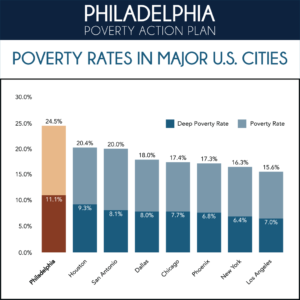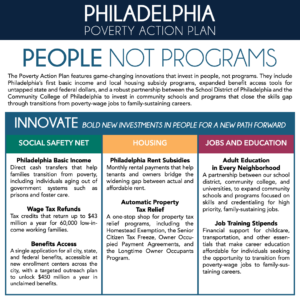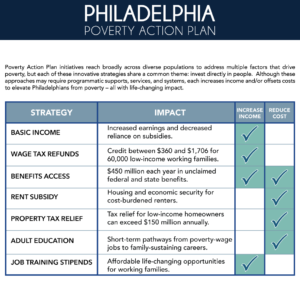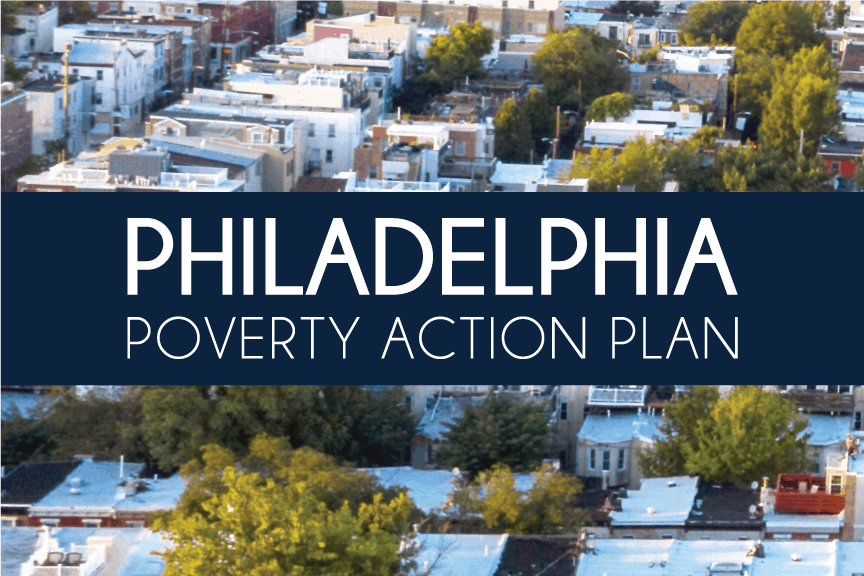Philadelphia, March 3, 2020 – Seeking to shed an unwelcome designation as the poorest large city in the country, a City Council special committee today unveiled a Poverty Action Plan anchored by innovations intended to lift 100,000 Philadelphians out of poverty over the next four years.
 Council’s Special Committee on Poverty Reduction and Prevention, joined by Council President Darrell Clarke, Mayor Jim Kenney, and non-profit, business, academic and legislative leaders, delivered a detailed, 14-page Action Plan with strategies to lower Philadelphia’s high poverty rate of 24.5 percent – which includes 377,116 residents.
Council’s Special Committee on Poverty Reduction and Prevention, joined by Council President Darrell Clarke, Mayor Jim Kenney, and non-profit, business, academic and legislative leaders, delivered a detailed, 14-page Action Plan with strategies to lower Philadelphia’s high poverty rate of 24.5 percent – which includes 377,116 residents.
“One out of every four Philadelphians lives in poverty,” said Council President Clarke. “That is unacceptable. For the last year, our Special Committee has met with residents and stakeholders across the city, listening to their best ideas to create jobs and lift people out of poverty. The result is our Action Plan, a public-private partnership with actionable steps and a mission: Lift 100,000 Philadelphians out of poverty by 2024.”
The Special Committee is being led by Councilmember Maria Quiñones Sánchez (7th District), along with her co-chairs Sharmain Matlock-Turner of the Urban Affairs Coalition, Mel Wells of One Day At A Time Inc., Eva Gladstein with the city Managing Director’s Office, and Councilmember Allan Domb (At Large).
“Poverty alleviation is traditionally a role of the federal government, but now more than ever, cities like ours must lead on this and other critical issues,” said Mayor Jim Kenney. “I commend Council and all the partners for joining together to tackle the greatest challenge of our city. Our Administration is committed to enacting our three-prong approach to reducing poverty. This includes: providing support and stabilizing households of those in need now; helping more Philadelphians raise their incomes through job training and workforce development; and making historic investments in education and criminal justice reform that will break the cycle of intergenerational poverty for good.”
Councilmember Quiñones Sánchez explained why this Poverty Action Plan was different from other, previous poverty reduction plans.
“This call to action and our report calls for direct investments in people – not programs,” Quiñones Sánchez said. “We are here talking about rent subsidies that mean cash to help pay the rent. Basic income subsidies that help pay the bills. Training stipends that help pay for classes, so that family members can afford the leap from poverty-wage jobs to family-sustaining careers.”
 Quiñones Sánchez stressed the Poverty Action Plan will be structured around public-private partnerships – not just government-run programs – to lift people out of poverty.
Quiñones Sánchez stressed the Poverty Action Plan will be structured around public-private partnerships – not just government-run programs – to lift people out of poverty.
The Plan envisions a role for the Community College of Philadelphia and the School District of Philadelphia around training low-wage workers for higher-paying jobs. It includes a role for the United Way of Greater Philadelphia and Southern New Jersey around a public-private Poverty Fund. It envisions a role for the Chamber of Commerce of Greater Philadelphia, which is focused on jobs growth in city neighborhoods. And it entails working with Philadelphia’s state legislative delegation, which is advocating to increase the minimum wage to $15 per hour for all workers in Pennsylvania.
The Special Committee’s co-chairs highlighted seven first-round strategies at today’s news conference, held in Council chambers on the 4th floor at City Hall. Many others are contained in the full Poverty Action Plan.
Wage Tax Refunds. Tax credits averaging $800 for 60,000 low-income workers.
Benefits Access. $450 million each year in unclaimed federal and state benefits.
Basic Income. Increased earnings to help families transition out of poverty.
Rent Subsidy. Housing and economic security for cost-burdened renters.
Property Tax Relief. One-stop shop for tax relief for low-income homeowners.
Adult Education. Partnerships between school district, community college and universities, to expand community schools and programs focused on job skills.
Job Training Stipends. Targeted tuition and living supports to make career education affordable and break the cycle of working adults stuck in poverty-wage jobs.
Councilmember Domb, the legislator whose wage tax credit bill passed Council last week, said today about this initiative: “We should not be filling the city’s coffers on the backs of people earning poverty wages. We should be putting their hard-earned money back into their pockets to help them thrive.”
 The Council leaders and the mayor were joined at today’s news conference by key leaders from the city’s philanthropic and business communities. Rev. Bill Golderer, President and CEO of the United Way of Greater Philadelphia and Southern New Jersey, attended, as did Rob Wonderling, President and CEO of the Chamber of Commerce for Greater Philadelphia. Golderer spoke of the United Way’s involvement in a Poverty Fund that will seek to attract private investment in the poverty reduction strategies. Wonderling spoke of the Chamber’s ongoing work around jobs growth in city neighborhoods as part of its Roadmap for Growth campaign.
The Council leaders and the mayor were joined at today’s news conference by key leaders from the city’s philanthropic and business communities. Rev. Bill Golderer, President and CEO of the United Way of Greater Philadelphia and Southern New Jersey, attended, as did Rob Wonderling, President and CEO of the Chamber of Commerce for Greater Philadelphia. Golderer spoke of the United Way’s involvement in a Poverty Fund that will seek to attract private investment in the poverty reduction strategies. Wonderling spoke of the Chamber’s ongoing work around jobs growth in city neighborhoods as part of its Roadmap for Growth campaign.
The city’s university community is engaged as well. The University of Pennsylvania and Drexel University sent representatives to today’s news conference.
Council President Clarke likened the Poverty Action Plan to what America did in the 1960s when it worked together to send a man to the moon. “Academics, scientists, political leaders – everyone – worked together, and America achieved its moonshot,” Clarke said. “This is our city’s Moonshot. We’re calling on everyone to work together to achieve this goal. That’s an effort worthy of a world-class city.”
# # #


